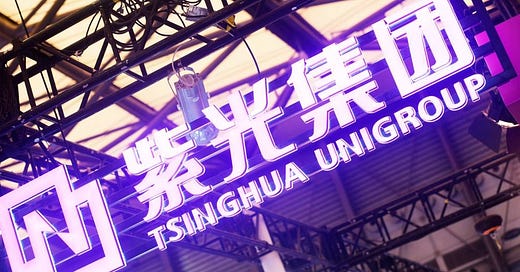Tsinghua Unigroup Struggles and China's Chip Ambitions Stumble
What happens when a national champion cant get a break?
BLUF: Tsinghua Unigroup was initially supposed to create a Chinese rival to MediaTek or Qualcomm. More recently it has focused on memory chips, yet now finds itself defaulting on loans and losing Chinese government support. Its failures deal a blow to China’s chip ambitions, but Beijing is in this for the long-haul.
Background
No company better represented China’s ambitions to develop its semiconductor sector following 2014’s National Integrated Circuit Plan and 2015’s Made in China 2025 Plan than Tsinghua Unigroup. A subsidiary of Tsinghua Holdings (which is itself a subsidiary of Tsinghua University, China’s MIT and Xi Jinping’s alma mater), Unigroup has been endowed with seemingly limitless funds to purchase leading international semiconductor companies and invest in domestic firms, working to accelerate the pace of the Chinese semiconductor industry’s progress as its most visible national champion. A report by the OECD last year estimated that total Chinese government support for Tsinghua Unigroup exceeded 30% of its consolidated revenue.
Buying Spree
Using its unique political and economic heft, Unigroup went on a buying spree in the mid 2010s: it purchased Spreadtrum in 2013 and RDA Microelectronics in 2014, combing the two companies in to UNISOC, an entity that designs chips for mobile devices and was supposed to challenge MediaTek (Taiwan) and Qualcomm’s (US) dominance in the sector. Intel (US) owned a stake in UNISOC for several years targeting Chinese 5G before dissolving the partnership in 2019 in a sign UNISOC’s efforts were not going to happen on time/on budget.
In 2015 Unigroup also apparently tried to buy a stake in the Taiwanese foundry industry. Unigroup chairman Zhao Weiguo allegedly approached TSMC’s founder Morris Chang with an offer to buy a stake in TSMC, to which Chang said “I am afraid you cant afford it.” This story is of-course apocryphal, but speaks to both Unigroup’s ambitions and TSMC’s position of strength in the industry: China’s national champion clearly recognized TSMC’s importance and wanted a piece of the action. And TSMC was in a position of such strength that it could simply say “no.”
After initially focusing its efforts on chip design, Unigroup then pivoted to the semiconductor fabrication business and focused its sights on memory chips. It made a $23 billion bid for Micron in 2015 and an offer to buy 15% of Western Digital in 2016. After those investments were blocked by the US government, Unigroup turned its sights to Chinese memory chip companies, “collaborating with local governments and the National IC Fund to invest in the construction of new memory fabs in Chengdu (Sichuan), Chongqing, Nanjing (Jiangsu), and Wuhan (Hubei).” Notable investments include: Yangtze Memory Technologies, Xi’an UnilC Semiconductor, and more recently announcing a DRAM project in June 2020. These investments and others Unigroup made in to Unisplendour, Guoxin Micro, and Linxens have seen mixed success (YMTC being the notable success story).
The Good Times Are Over
In November 2019 Unigroup experienced a bond selloff due to investor fears over the amount of debt it was taking on. A year later, and these concerns seem to be justified:
Chinese chipmaker Tsinghua Unigroup is to default on $2.5 billion of offshore bonds after failing to meet a Thursday [December 9, 2020] deadline to repay a $450 million Eurobond, while also missing an interest payment on one of its onshore bonds.
This bad news is compounded by a ~$200 million bond default in November. Thats a lot of bad news in a two month period for a company that has enjoyed seemingly limitless support from the Chinese government these past five years and raises questions about its future. The bad news looks set to continue in to 2021 as it faces a looming cash crunch:
As of June [2020], Unigroup was bleeding operating cash, burning through 15.4 billion yuan on research and development alone. It had 46.7 billion yuan of debt due within a year, with more than half owed to bond investors, but sat on only 42 billion yuan of unrestricted cash.
Some reports indicate that Tsinghua University/Tsinghua Holdings is shopping for a buyer of Tsinghua Unigroup, with the SOE China National Nuclear Corporation expressing interest. There is some history between the buyer and seller here, which makes these reports slightly more credible.
Conclusion
A shotgun marriage involving a Chinese SOE stepping in to rescue a Chinese national champion is certainly not the outcome Beijing had in mind for one of the leading lights of its semiconductor industry. Though Beijing is clearly committed to supporting the semiconductor industry in the long-term, Unigroup’s struggles are just another reminder that it has yet to figure out how to win in this industry in the short term.


